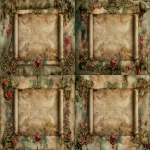Explore the Best AI Image Gallery

Quantum Computing Breakthroughs: A New Frontier in Creativity and Ethics
Quantum computing is no longer a theoretical concept limited to academia; it is rapidly evolving into a field with versatile applications that promise to transform various industries. Among those are the creative fields, which are increasingly leveraging this technology to enhance artistic expression and innovation. In this blog post, we'll explore the implications of recent breakthroughs in quantum computing, including its potential uses, ethical considerations, and future trends that may redefine creativity as we know it.
Understanding Quantum Computing
At its core, quantum computing is based on the principles of quantum mechanics. Unlike classical computers that use bits to process information as a series of ones and zeros, quantum computers utilize qubits, which can exist in multiple states simultaneously. This allows them to perform complex calculations at speeds unattainable by classical machines.
The Impact on the Creative Industry
As quantum computing matures, its potential applications in creative industries become more apparent. Here are some of the ways it can impact creative fields:
- Enhanced Data Processing: Quantum computers can analyze enormous datasets rapidly, offering insights that aid in creative processes like design and content generation.
- Innovative Content Creation: By utilizing quantum algorithms, creators can explore unprecedented thematic structures and storytelling techniques that challenge traditional narratives.
- AI Collaboration: Quantum-powered AI could create more advanced tools for artists, enabling more nuanced artistic expression and innovative workflows.
Potential Uses of Quantum Computing
The applications for quantum computing within creative industries range widely. Some key areas include:
- Music Composition: Quantum computing can allow composers to experiment with complex harmonics and polyphonic structures, generating new forms of music that merge technology and artistry.
- Visual Arts: Artists could exploit quantum algorithms to develop intricate visual patterns and effects, reimagining interactive installations and performances.
- Game Design: The gaming industry stands to benefit significantly from quantum computing through enhanced simulation capabilities and the creation of more dynamic environments.
Ethical Considerations
While the potential benefits of quantum computing are tantalizing, they also bring forward ethical considerations:
- Access Inequity: Advanced quantum tools may only be available to a select few, exacerbating existing inequalities in the creative landscape.
- Cultural Appropriation: The potential for AI-driven creative processes to borrow or replicate aspects of various cultures raises questions about the ownership of ideas and originality.
- Job Displacement: As quantum computing and AI evolve, the possibility of job displacement in traditional creative roles poses a considerable concern.
Future Trends in Quantum Computing and Creativity
The landscape of art and technology is continuously evolving. Here are some anticipated trends in the realm of quantum computing and creativity:
- Interdisciplinary Collaborations: Expect to see more synergies between technologists and artists, breaking down silos as they co-create.
- Crowd-Sourced Creativity: Platforms that merge quantum computing with crowd-sourced ideas may emerge, enabling everyone to contribute to creative endeavors.
- Quantum Virtual Reality: Creating immersive experiences that combine quantum computing with VR may redefine storytelling and viewer engagement.
Conclusion
In summation, the interplay between quantum computing and the creative industry opens up a new vista of possibilities, from reimagining artistic processes to presenting ethical challenges that demand careful consideration. As we navigate this evolving landscape, stakeholders in both the tech and creative sectors must engage in dialogue about the implications of quantum advancements, focusing on inclusive practices that democratize access and preserve the fidelity of cultural expressions. The leap into this uncharted territory may herald not just a revolution in technology, but a renaissance in creativity itself.
](https://images.ai-img.art/thumbnails/150/7599c9e7507c77a975081d554947c9dea123e678a7ece42d30f571f639620598.webp)






](https://images.ai-img.art/thumbnails/150/031692dcf8fbf869092e8cea50f9411a45dadc1f189ea67b8dece8e02952a7e3.webp)



](https://images.ai-img.art/thumbnails/150/efd8a9ad06ef2c72e3378698ad5e592d3d2bf8eff85c25e75db7c9902c7be353.webp)
